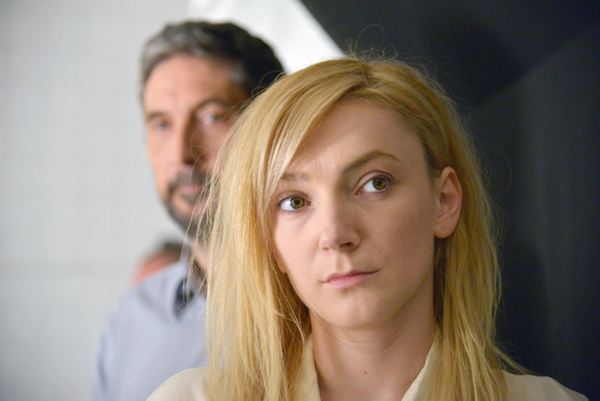Movie review by Greg Carlson
Hungarian filmmaker Ildiko Enyedi, whose 1989 debut “My Twentieth Century” won the Camera d’Or at the Cannes Film Festival, achieved another career highlight recently with an Oscar nomination for her most recent feature. “On Body and Soul” has been selected to compete for Best Foreign Language Film at the 90th Academy Awards. The movie is currently available to view on Netflix.
Despite the bloody immediacy of the film’s slaughterhouse setting, “On Body and Soul” is an often ethereal and meditative romance. Endre (Geza Morcsanyi) is the lonely CFO at a meat processing plant on the edge of Budapest. Maria (Alexandra Borbely) joins the staff as a by-the-book quality inspector. Despite not knowing one another, Endre and Maria somehow share an identical series of dreams — a seemingly impossible coincidence revealed in the course of interviews conducted during an investigation into the theft of a potent dose of bovine mating stimulant.
Enyedi slyly observes both very familiar human behavior and the more cerebral and poetic dreaminess that addresses the challenges of making meaningful and intimate human connections in a modern world. The director’s interest extends briefly to a few supporting characters, including Reka Tenki’s psychological tester/human resources consultant and Ervin Nagy’s cagey, nervous new hire. Zoltan Schneider, as Endre’s leering, impolitic lunch partner, might have been given a little more to earn the payoff Enyedi prepares for him.
“On Body and Soul” is patient and deliberate. Those qualities effectively serve Endre and Maria from start to finish, but do put some strain on the movie’s secondary storylines. Viewers seeking muscular plotting should look elsewhere — Enyedi is far less engaged with the idea of a deep investigation of the meanings/possibilities of the parallel dreaming (a real shame) and the outcome of the missing vial than she is in the unique contours of the leads, even if Maria’s quirkier markers, like her comprehensive and superhuman memory, will test the patience of some.
Enyedi concentrates primary attention on the lives of her two protagonists, shifting among scenes at the abattoir (including several awkward and deadpan exchanges in the company cafeteria) and scenes of each character outside of the workplace, often, though not always, alone. Once the mysterious double-dream motif — a forest scene in which a doe and a buck forage for juicy leaves under the snow — links Endre and Maria early in the movie, the narrative appears to place the characters on pathways that will inevitably intersect with one another. Enyedi, however, exhibits less concern for the barriers that separate the two and much more interest in the idiosyncratic details that shape and govern their personalities.
The almost painfully reserved and taciturn Endre seems practically outgoing next to Maria, who blurts out declarations of raw honesty that alienate her from the rest of her coworkers. Despite the scarcely concealed ridicule of Maria by several employees, Enyedi methodically aligns audience sympathy with her, and Borbely commits to the character’s prickliness. The dream motif unsurprisingly brings Maria into close proximity to Endre, but the director withholds a payoff related to that theme in favor of an intense climactic exchange that deftly balances on a tightrope stretched between potential tragedy and black comedy.
